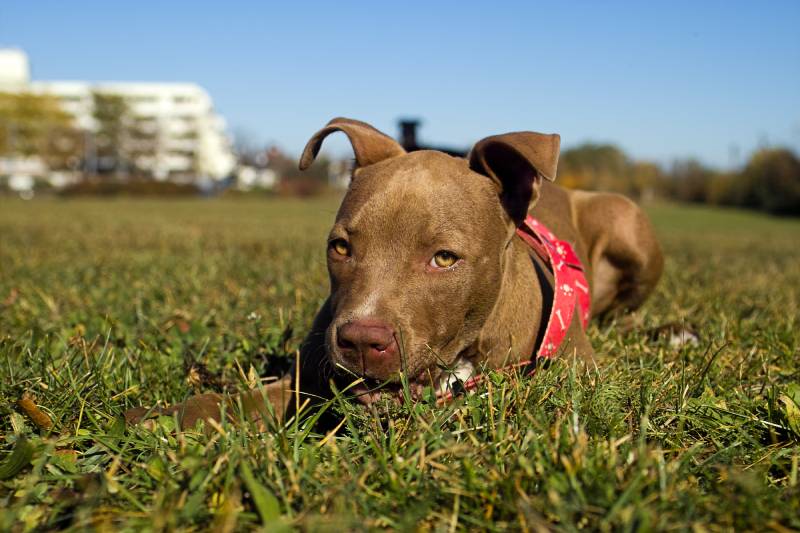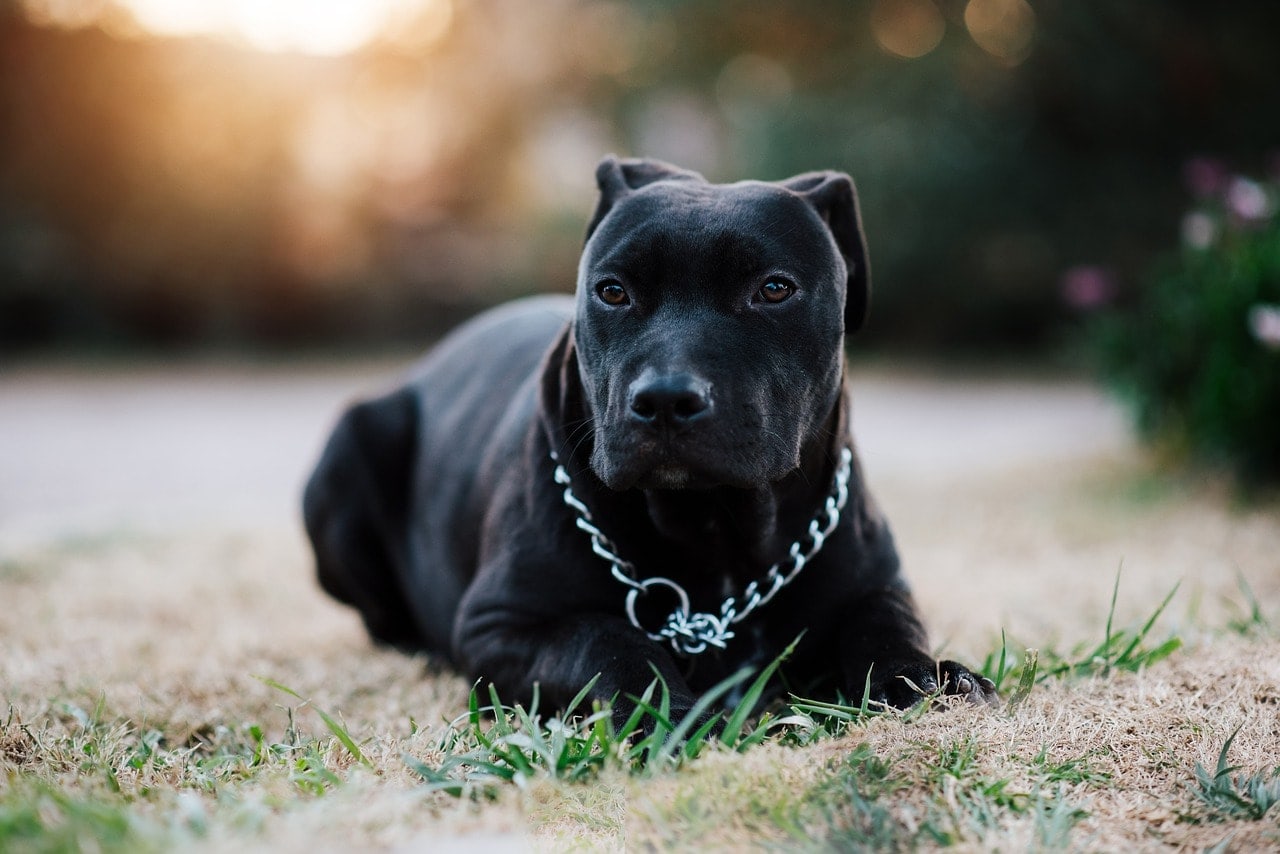In this article
View 2 More +Pitbulls are a popular dog known for their strength and loyalty. While Pitbulls are not an official breed, these dogs fall under the umbrella category of Pitbull:
- American Pitbull Terrier
- Staffordshire Bull Terrier
- American Staffordshire Terrier
However, they also have a reputation for being aggressive, which can sometimes be a cause for concern. Before you decide to bring a Pitbull into your life, it’s essential to understand the pros and cons of owning one. Here’s a list of 10 pros and cons that you need to know about Pitbulls.

Top 5 Pitbull Pros
1. Loyal and Affectionate Companions
Pitbulls are known for their loyalty and strong bond with their owners. They’re great at forming deep connections with their human families and can be incredibly affectionate. If you’re looking for a loving and devoted pet, a Pitbull could be an excellent choice for you.
They are often eager to please their owners, making them highly trainable. And their loving nature means they’ll become a cherished member of your family, providing plenty of cuddles and love.

2. High Energy and Playfulness
Pitbulls are energetic and love to play. They enjoy running, jumping, and playing fetch, making them great exercise partners. If you’re an active person who enjoys spending time outdoors, a Pitbull might be the perfect companion for your lifestyle.
Their high energy levels also mean they’re likely to keep you motivated to stay active and healthy. Pitbulls can make fantastic running or hiking buddies, and their playfulness can bring a lot of joy and laughter to your life.
3. Great with Kids
Pitbulls can be excellent family pets and are known to be gentle and patient with children. They are often referred to as “nanny dogs” because of their protective nature and ability to form strong bonds with kids.
However, as with any dog, it’s important to teach children how to interact safely with pets to prevent accidents. Supervision and proper education are key to fostering a positive relationship between your Pitbull and your children, ensuring everyone’s safety and happiness.
4. Low Maintenance Grooming
Pitbulls have short coats, which makes them relatively low maintenance when it comes to grooming. They don’t require frequent baths or haircuts, and a quick brush once a week is usually enough to keep their coats looking healthy and shiny.
This is a significant advantage for busy pet owners who may not have the time or resources to commit to high-maintenance grooming routines. However, it’s still essential to maintain a regular grooming schedule to minimize shedding and keep your Pitbull looking and feeling their best.

5. Excellent Guard Dogs
Pitbulls have a natural instinct to protect their family, making them great guard dogs. They are alert and will often bark to warn you of potential threats. With proper training, a Pitbull can be an effective and reliable protector for your home and family.
Their intimidating appearance can act as a deterrent for would-be intruders, while their loyalty and courage ensure they’ll be there to protect you if needed. It’s essential to teach your Pitbull the difference between real threats and harmless visitors to avoid unnecessary aggression.

Top 5 Cons of Owning a Pitbull
1. Breed-Specific Legislation
Unfortunately, Pitbulls are subject to breed-specific legislation (BSL) in some areas. This means that there may be restrictions on owning a Pitbull or similar breeds, depending on where you live.
It’s essential to research local laws before considering getting a Pitbull to avoid any legal issues. BSL can result in increased costs for insurance, potential fines, and even the heartbreaking situation of having to give up your beloved pet if you’re found to be in violation of these laws.

2. Potential Aggression
While not all Pitbulls are aggressive, the breed has a reputation for being more likely to exhibit aggressive behavior. This can be managed with proper training and socialization, but it’s important to be aware of this potential issue when considering a Pitbull.
Make sure you’re committed to putting in the time and effort to properly train and socialize your dog. It’s crucial to start early and to expose your Pitbull to various people, animals, and environments to ensure they grow up to be well-rounded and well-behaved adults.
3. Need for Strong Leadership
Pitbulls are intelligent and strong-willed dogs, which means they require a confident and consistent leader. If you’re not experienced with dog training, or you’re not prepared to invest time in training your Pitbull, you may find it challenging to establish yourself as the pack leader, leading to potential behavior issues.
What’s more, Pitbulls can become stubborn or willful if they sense a lack of leadership. As such, it’s essential to be consistent with your training and boundaries to ensure a well-behaved and happy dog.
4. Prone to Health Issues
Pitbulls can be prone to certain health issues, such as hip dysplasia, allergies, and heart disease. It’s essential to choose a reputable breeder and keep up with regular vet check-ups to help manage and prevent potential health problems.
Be prepared for the possibility of higher vet bills and the need for special care as your Pitbull ages. Investing in pet insurance can be a wise choice to help offset any unexpected medical expenses and ensure your Pitbull receives the best possible care throughout their life.
If you are concerned about the health and well-being of your pet, seek veterinary advice for the best course of action.
If you need to speak with a vet but can't get to one, head over to PangoVet. It's our online service where you can talk to a vet online and get the advice you need for your pet — all at an affordable price!

5. Stigma Surrounding the Breed
Unfortunately, Pitbulls are often misunderstood and stigmatized due to their association with dog fighting and aggression. As a Pitbull owner, you may face judgment or fear from others who may not understand the true nature of the breed.
It’s important to be prepared for these reactions and to educate others on the positive qualities of Pitbulls to help break down stereotypes. Joining a local Pitbull group or engaging in positive community activities can help demonstrate the loving and well-behaved nature of your dog, promoting a better understanding of the breed.

Top 5 Tips to Ensure the Best Care for Your Pitbull
After considering the pros and cons of owning a Pitbull, if you decide that this breed is the perfect addition to your family, it’s important to provide the best possible care for your new furry friend. Here are some essential tips to help you ensure a happy, healthy, and well-adjusted Pitbull.
1. Start Training and Socialization Early
Begin training and socializing your Pitbull as early as possible, ideally when they’re a puppy. Expose them to various people, animals, and environments to help them develop a well-rounded temperament.
Consistent, positive reinforcement-based training will help you establish your leadership role and create a strong bond between you and your dog.

2. Maintain a Consistent Exercise Routine
Pitbulls are high-energy dogs that require regular exercise to stay physically and mentally healthy. Establish a consistent exercise routine that includes daily walks, play sessions, and mental stimulation, such as puzzle toys or obedience training. This will help keep your Pitbull happy and well-behaved.
3. Feed a Balanced Diet
Feeding your Pitbull a well-balanced diet is crucial for maintaining their overall health. Choose a high-quality dog food that meets their nutritional needs and consult with your veterinarian for specific recommendations based on your dog’s age, weight, and activity level. Be mindful of portion sizes and avoid overfeeding to prevent obesity and related health issues.

4. Regular Vet Check-ups and Vaccinations
Regular veterinary check-ups and vaccinations are essential for your Pitbull’s long-term health. Keep up-to-date with vaccinations and ensure your dog receives routine examinations to detect and treat any potential health issues early on.
Discuss preventative care options, such as heartworm and flea prevention, with your vet to keep your Pitbull healthy and protected.
5. Invest in Obedience Classes or Professional Training
If you’re new to dog ownership or need help with training your Pitbull, consider investing in obedience classes or professional training. A skilled trainer can help you establish yourself as the pack leader, teach you effective training techniques, and address any specific behavior issues your dog may be experiencing.
Keep in mind that these are only a few tips to get you started. Caring for your Pitbull is a lifelong journey, one that requires continual learning and growing. But by following these tips and others, you can provide the best possible care for your Pitbull, ensuring a happy, healthy, and well-adjusted companion for years to come.

Conclusion
Pitbulls can be loving, loyal, and protective companions, but they also come with some challenges. Before adopting a Pitbull, it’s crucial to carefully consider the pros and cons listed above and determine if this breed is the right fit for your lifestyle and needs. With proper training, socialization, and care, a Pitbull can make a wonderful addition to your family!
See also:
Featured Image Credit: Roberto Cabrera Castro, Shutterstock























